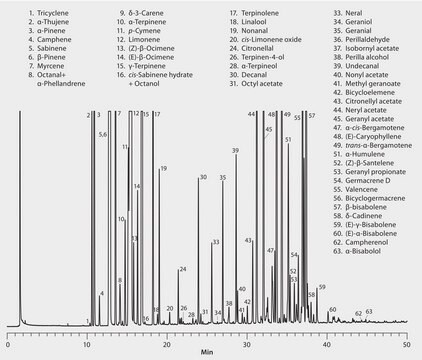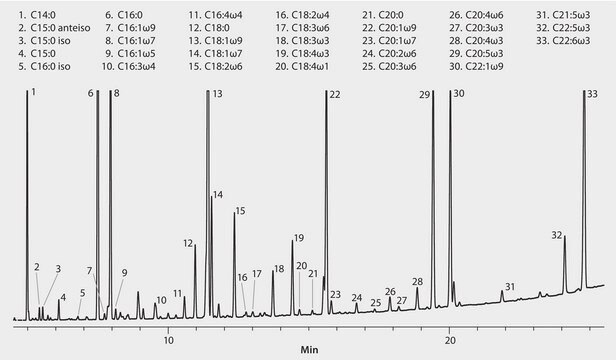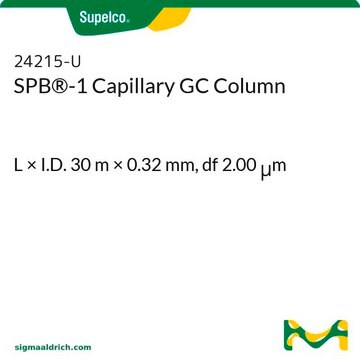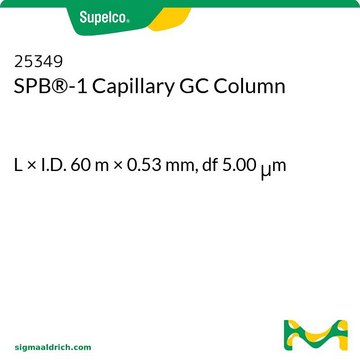24028
SPB®-1 Capillary GC Column
L × I.D. 30 m × 0.25 mm, df 0.25 μm
Sign Into View Organizational & Contract Pricing
All Photos(1)
About This Item
UNSPSC Code:
41115710
eCl@ss:
32119290
Recommended Products
material
fused silica
Quality Level
Agency
meets requirements for USP G1, G2, and G9
parameter
-60-320 °C temperature (isothermal or programmed)
Beta value
250
df
0.25 μm
technique(s)
gas chromatography (GC): suitable
L × I.D.
30 m × 0.25 mm
matrix active group
Bonded; poly(dimethyl siloxane) phase
column type
capillary non-polar
Looking for similar products? Visit Product Comparison Guide
General description
Application: This column is often used for traditional general purpose applications, where a non-polar column is required. Analytes will be separated primarily according to boiling point.
USP Code: This column meets USP G1, G2, and G9 requirements.
Phase:
USP Code: This column meets USP G1, G2, and G9 requirements.
Phase:
- Bonded
- Poly(dimethyl siloxane)
- ≤0.32 mm I.D., <2 μm: -60 °C to 320 °C (isothermal or programmed)
- ≤0.32 mm I.D., ≥2 μm: -60 °C to 300 °C (isothermal or programmed)
- ≥0.53 mm I.D., <2 μm: -60 °C to 300 °C (isothermal) or 320 °C (programmed)
- ≥0.53 mm I.D., ≥2 μm: -60 °C to 260 °C (isothermal) or 280 °C (programmed)
Application
SPB®-1 Capillary GC Column was used for speciation of the nitrogen compounds (quantitatively), which are polar and somewhat basic in nature, with chemiluminescence detection.
Other Notes
We offer a variety of chromatography accessories including analytical syringes
Legal Information
SPB is a registered trademark of Merck KGaA, Darmstadt, Germany
Storage Class Code
10 - Combustible liquids
WGK
WGK 1
Flash Point(F)
214.0 °F - closed cup
Flash Point(C)
101.1 °C - closed cup
Choose from one of the most recent versions:
Already Own This Product?
Find documentation for the products that you have recently purchased in the Document Library.
Customers Also Viewed
C B'Hymer
Journal of chromatographic science, 45(6), 293-297 (2007-07-14)
An automated static headspace gas chromatographic method for the determination of residual solvents in the bulk drug substance alpha-phenyl-1-(2-phenylethyl)-piperine methanol, a serotonin 5-HT2 receptor antagonist, is evaluated. The method includes the use of 1-propanol as an internal standard. The gas
C B'Hymer
Journal of chromatographic science, 46(5), 369-374 (2008-05-22)
A static headspace gas chromatographic method is developed and evaluated for the quantitation of residual 2-propanol, methanol, and toluene in bulk (2alpha, 6alpha, 8alpha, 9alpha beta)-octahydro-3-oxo-2,6-methanon-2H-quinolizin-8-yl-1H-indole-3-caboxylate methanesufonate hydrate, a serotonin 5-HT3 receptor antagonist drug compound. This method is accurate and
Y Matsuzaki et al.
Yakugaku zasshi : Journal of the Pharmaceutical Society of Japan, 111(10), 617-620 (1991-10-01)
Gomisin A (TJN-101) is one of the lignan components isolated from Schisandra Fruits. A high sensitive and precise method for the determination of TJN-101 and its major metabolite (Met. B) in the rat serum was developed by selected ion monitoring
O S Fedianina
Genetika, 46(3), 332-339 (2010-04-16)
Tubulin-folding cofactor D is necessary for the assembly of tubulin heterodimers and, possibly, plays additional roles in the cell. The effects of cofactor D, microtubules, and/or tubulin dimers on the mitosis initiation were studied in Schizosaccharomyces pombe. It was found
J M Santiuste et al.
Journal of chromatography. A, 1002(1-2), 155-168 (2003-07-30)
The chlorinated organic compounds are very important from the point of view of the chemical industry and environmental protection, and therefore the gas chromatographic analysis of these compounds is very interesting for analytical chemists. In this paper we studied the
Our team of scientists has experience in all areas of research including Life Science, Material Science, Chemical Synthesis, Chromatography, Analytical and many others.
Contact Technical Service







